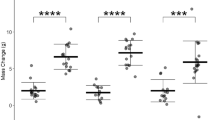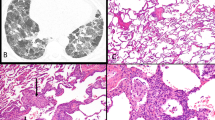Abstract
IN the course of experiments on the possible participation of diphosphopyridine nucleotide (DPN) and diphosphopyridine nucleotidase (DPNase, hydrolysing DPN at the nicotinamide–ribose link) in anaphylactic reactions in sensitized guinea pig lung, it was incidentally discovered that DPNase activity in lung varies with the weight of the animal. In early experiments it was noted that heavy guinea pigs (approximately 500–800 gm.) sensitized with bovine serum albumin consistently had high levels of DPNase activity in their lungs, whereas smaller animals had lower levels. These coarse observations led us to investigate the relation of lung DPNase activity to weight of animal. Since the weight of a guinea pig is approximately linearly related to its age, at least during the first 12 weeks of life, the data can be considered also in relation to age.
This is a preview of subscription content, access via your institution
Access options
Subscribe to this journal
Receive 51 print issues and online access
$199.00 per year
only $3.90 per issue
Buy this article
- Purchase on Springer Link
- Instant access to full article PDF
Prices may be subject to local taxes which are calculated during checkout
Similar content being viewed by others
References
Zatman, L. J., Kaplan, N. O., and Ciotti, M. M., J. Biol. Chem., 191, 473 (1953).
Author information
Authors and Affiliations
Rights and permissions
About this article
Cite this article
MIDDLETON, E., DEVI, A. Guinea Pig Lung Diphosphopyridine Nucleotidase in Relation to Weight (Age). Nature 193, 1179–1180 (1962). https://doi.org/10.1038/1931179a0
Issue Date:
DOI: https://doi.org/10.1038/1931179a0
Comments
By submitting a comment you agree to abide by our Terms and Community Guidelines. If you find something abusive or that does not comply with our terms or guidelines please flag it as inappropriate.



